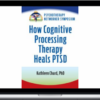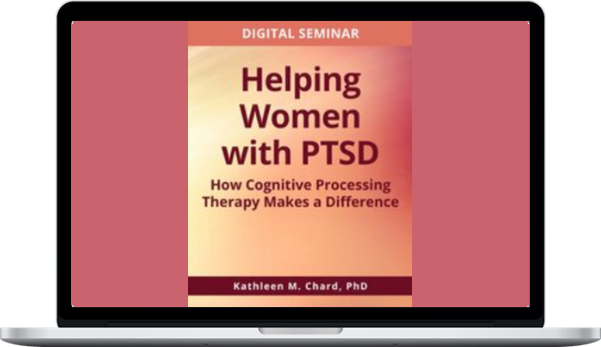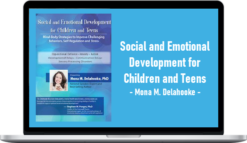Kathleen Chard – Helping Women With PTSD: How Cognitive Processing Therapy Makes A Difference
$69.00 $21.00
»Delivery: Within 24hs
Description
Kathleen Chard – Helping Women With PTSD: How Cognitive Processing Therapy Makes A Difference
Description Of Helping Women With PTSD: How Cognitive Processing Therapy Makes A Difference
Cognitive Processing Therapy (CPT) was the first evidence-based treatment for PTSD that was designed for women survivors of rape and child abuse. The manual has been translated into 14 languages and has been proven to be effective at treating PTSD and related symptoms of depression, shame and guilt in women recovering from all types of traumatic events. CPT can be used with clients who have complex PTSD histories and the results have been shown to last 5-10 years later. This recording will provide a brief review of the evidence for CPT followed by a brief overview of how the treatment can help women regain the control of their lives after bring impacted by traumatic events.
What You’ll Learn In Helping Women With PTSD: How Cognitive Processing Therapy Makes A Difference
Objectives
- Describe the research in support of CPT.
- Assess client’s trauma history to assist in determining if CPT is an effective option.
- Utilize CPT theory in their conceptualization of PTSD with their clients.
Outline
- Introduction to Cognitive Processing Therapy
- Review of the Research on CPT
- Focus on women and diversity
- Overview of the CPT Protocol
- How to Become Trained in CPT
Target Audience
- Counselors
- Marriage & Family Therapists
- Psychologists
- Social Workers
- Other Mental Health Professionals
About Kathleen Chard
Kathleen Chard, PhD, is a co-developer of CPT and director of the Trauma Recovery Center at the Cincinnati VA Medical Center. Serving as the VA CPT Implementation Director, Dr Chard oversees the dissemination of CPT to mental health clinicians across the United States. She is the co-author of Cognitive Processing Therapy for PTSD: A Comprehensive Model (The Guilford Press, 2017) and author of CPT for Sexual Abuse treatment manual (2012).
A sought-after speaker, Dr Chard has personally trained over 5,000 clinicians throughout the United States on using CPT with veterans, active duty personnel, and civilians in addition to overseeing the training of tens of thousands of others via the trainers she supervises. She is co-chair of a 17-site study comparing CPT to Prolonged Exposure in US veterans in addition to conducting a $6 million-dollar Department of Defense study on the assessment of PTSD. She served as a past editor of the Journal of Traumatic Stress and is a professor of Clinical Psychiatry and Behavioral Neuroscience at the University of Cincinnati.
Speaker Disclosures:
Financial: Kathleen Chard has employment relationships with CPT Training Institute, the Cincinnati Veterans Administration Medical Center, the University of Cincinnati, and the Department of Veterans Affairs. She receives royalties as a published author. She has a research activity that is grant funded through Health Services Research and Development Service, PESI Foundation, IAA with USAMMDA and CVAMC. Kathleen Chard receives a speaking honorarium, recording, and book royalties from Psychotherapy Networker and PESI, Inc. She has no relevant financial relationships with ineligible organizations.
Non-financial: Kathleen Chard is an ad hoc reviewer for several peer review journals, for a complete list contact PESI, Inc. She is a member of the International Society for Traumatic Stress Studies.
More courses from the same author: Kathleen Chard
Delivery Policy
When will I receive my course?
You will receive a link to download your course immediately or within 1 to 21 days. It depends on the product you buy, so please read the short description of the product carefully before making a purchase.
How is my course delivered?
We share courses through Google Drive, so once your order is complete, you'll receive an invitation to view the course in your email.
To avoid any delay in delivery, please provide a Google mail and enter your email address correctly in the Checkout Page.
In case you submit a wrong email address, please contact us to resend the course to the correct email.
How do I check status of my order?
Please log in to HealingCourse account then go to Order Page. You will find all your orders includes number, date, status and total price.
If the status is Processing: Your course is being uploaded. Please be patient and wait for us to complete your order. If your order has multiple courses and one of them has not been updated with the download link, the status of the order is also Processing.
If the status is Completed: Your course is ready for immediate download. Click "VIEW" to view details and download the course.
Where can I find my course?
Once your order is complete, a link to download the course will automatically be sent to your email.
You can also get the download link by logging into your HealingCourse account then going to Downloads Page.
Related products
Total sold: 1









